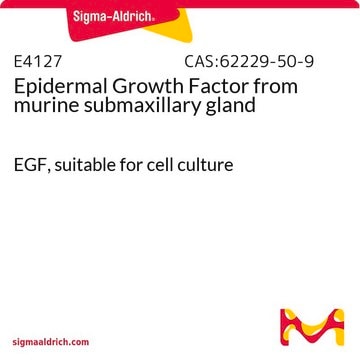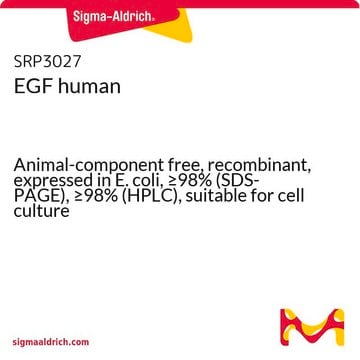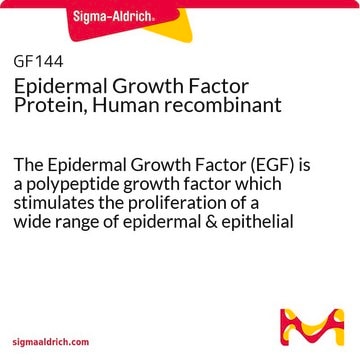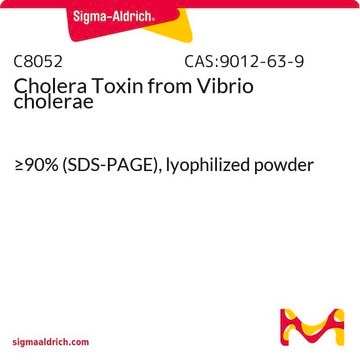GF155
Epidermal Growth Factor Protein, Recombinant mouse
The Epidermal Growth Factor (EGF) is a polypeptide growth factor, which stimulates the proliferation of a wide range of epidermal & epithelial cells.
Synonym(s):
EGF
Sign Into View Organizational & Contract Pricing
All Photos(1)
About This Item
UNSPSC Code:
12352202
eCl@ss:
32160405
NACRES:
NA.77
Recommended Products
Related Categories
General description
Epidermal Growth Factor (EGF) is a polypeptide growth factor, which stimulates the proliferation of a wide range of epidermal and epithelial cells. Recombinant murine EGF is a 6.2 kDa protein containing 54 amino acid residues.
Product Source: E.coli
Application
For most in vitro applications, EGF exerts its biological activity in the concentration range of 0.5 to 25.0 ng/mL. Responding cells are (partial list): Epidermal mesothelial cells.
The Epidermal Growth Factor (EGF) is a polypeptide growth factor, which stimulates the proliferation of a wide range of epidermal & epithelial cells.
Linkage
Replaces: GF123
Physical form
Lyophilized from sterile filtered 10 mM Sodium Phosphate, pH 7.5, containing no additives.
Storage and Stability
The lyophilized EGF, though stable at room temperature, is best stored desiccated at -20°C. Reconstitute with water to a concentration of 0.1 - 1 mg/mL. This solution can be diluted into other buffered solutions and stored at 4°C for 1 week or -20°C for future use. Reconstituted EGF should be maintained at -20°C in undiluted aliquots for up to one year.
Analysis Note
Specific Activity: Mouse EGF is fully biologically active when compared to standards.The ED50, as determined by its dose-dependent mitogenic activity on BALB/c 3T3 cells, is ≤ 0.15 ng/mL
Legal Information
CHEMICON is a registered trademark of Merck KGaA, Darmstadt, Germany
Disclaimer
Unless otherwise stated in our catalog or other company documentation accompanying the product(s), our products are intended for research use only and are not to be used for any other purpose, which includes but is not limited to, unauthorized commercial uses, in vitro diagnostic uses, ex vivo or in vivo therapeutic uses or any type of consumption or application to humans or animals.
Storage Class Code
11 - Combustible Solids
WGK
WGK 1
Flash Point(F)
Not applicable
Flash Point(C)
Not applicable
Certificates of Analysis (COA)
Search for Certificates of Analysis (COA) by entering the products Lot/Batch Number. Lot and Batch Numbers can be found on a product’s label following the words ‘Lot’ or ‘Batch’.
Already Own This Product?
Find documentation for the products that you have recently purchased in the Document Library.
Min-Yi Ou et al.
Development (Cambridge, England), 147(10) (2020-04-24)
Cortex development is controlled by temporal patterning of neural progenitor (NP) competence with sequential generation of deep and superficial layer neurons, but underlying mechanisms remain elusive. Here, we report a role for heterogeneous nuclear ribonucleoprotein A3 (HNRNPA3) in regulating the
Tee Jong Huat et al.
International journal of molecular sciences, 16(5), 9693-9718 (2015-05-06)
Insulin-like growth factor 1 (IGF-1) enhances cellular proliferation and reduces apoptosis during the early differentiation of bone marrow derived mesenchymal stem cells (BMSCs) into neural progenitor-like cells (NPCs) in the presence of epidermal growth factor (EGF) and basic fibroblast growth
Our team of scientists has experience in all areas of research including Life Science, Material Science, Chemical Synthesis, Chromatography, Analytical and many others.
Contact Technical Service








